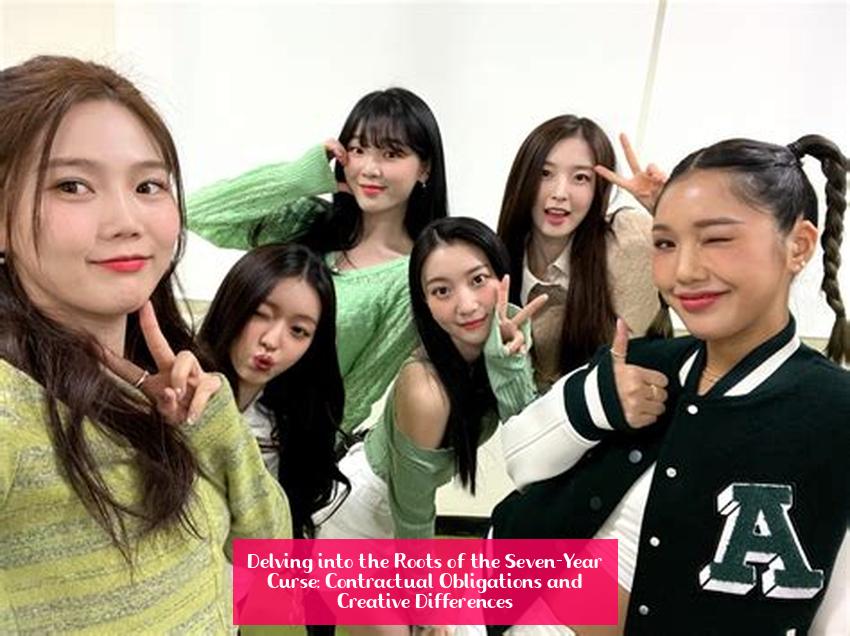Unveiling the mysterious “7-year curse” that haunts the K-pop industry has become a riddle wrapped in an enigma for fans and artists alike. Join us as we embark on a thrilling journey to uncover the secrets behind this notorious phenomenon in our comprehensive examination of the 7 year curse in K-pop. From contractual obligations to creative differences and the triumphs of groups like Blackpink, we’ll navigate the twists and turns of this intriguing topic, revealing how resilience and unity have shattered the curse for some. Get ready to delve into the captivating world of K-pop and discover how artists are defying the odds and overcoming adversity in the face of the infamous 7-year jinx.
Discover: How Long Does a K-Pop Comeback Last? Exploring the Promotional Cycle and Its Impact
Key Takeaways
- The 7-year curse in K-pop refers to the disbanding of most K-pop groups seven years after their debut due to the termination of their exclusive contracts with their agency.
- K-pop groups typically sign exclusive contracts that last for seven years, which is the standard determined by the Fair Trade Commission.
- Some K-pop groups, such as BTS, SHINee, and Brown Eyed Girls, have defied the seven-year curse and retained their original lineup by renewing their contracts.
- Blackpink has defied the seven-year curse by having all members – Jennie, Lisa, Rose, and Jisoo – remain in the group, despite reaching the end of their seven-year contract.
- The seven-year curse is a widely known phenomenon in the K-pop industry, with many groups struggling to make it through this period without disbanding or losing members.
- Surviving the seven-year mark is a definitive moment in every K-pop group’s career, and making it past this point unscathed is a significant achievement.
The Notorious Seven-Year Curse in K-Pop: A Comprehensive Examination

More related > Did BTS Disband in 2025? Unraveling the Hiatus and Reunion Plans
Unveiling the Seven-Year Curse: A Widespread Phenomenon in K-Pop
K-Pop, a global musical sensation, has captivated audiences worldwide with its vibrant performances, catchy melodies, and captivating idols. However, behind the glitz and glamour lies a lesser-known reality: the seven-year curse. This phenomenon refers to the alarmingly high rate of K-Pop group disbandments approximately seven years after their debut. This curse has become a widely acknowledged pattern, leaving fans and industry experts alike wondering about its causes and implications.
Delving into the Roots of the Seven-Year Curse: Contractual Obligations and Creative Differences

The seven-year curse is deeply rooted in the contractual agreements between K-Pop idols and their agencies. Typically, these exclusive contracts span seven years, a duration determined by the Fair Trade Commission. This extended commitment often hinders creative freedom and artistic growth, leading to dissatisfaction and a desire for autonomy among idols. Additionally, financial disputes and differing artistic visions can further exacerbate tensions within the group, potentially culminating in disbandment.
Shattering the Curse: Groups Defying the Seven-Year Jinx
While the seven-year curse looms large over the K-Pop industry, a few notable groups have defied the odds and persevered beyond the dreaded seven-year mark. Groups like BTS, SHINee, and Brown Eyed Girls have successfully renewed their contracts, maintaining their original lineup and continuing to captivate fans with their musical prowess. Such resilience and dedication serve as beacons of hope, demonstrating that the seven-year curse is not an inevitable fate.
Blackpink’s Triumph Over the Seven-Year Curse: A Testament to Unity and Success
Blackpink, a prominent girl group in K-Pop, has recently defied the seven-year curse by retaining all four members – Jennie, Lisa, Rosé, and Jisoo – despite reaching the end of their seven-year contract. This remarkable achievement showcases the group’s unwavering commitment to their craft and their harmonious relationship with their agency. Blackpink’s success stands as a testament to the power of unity and perseverance, inspiring other K-Pop groups to strive for longevity and artistic fulfillment.
Navigating the Crossroads: Solo Careers and Changing Group Dynamics
As idols approach the end of their contracts, it is not uncommon for them to contemplate solo careers or pursue different paths entirely. This can lead to the dissolution of groups or the departure of individual members, contributing to the prevalence of the seven-year curse. However, some groups have managed to navigate this transition successfully, maintaining a close bond despite pursuing individual endeavors.
Conclusion: Embracing Resilience and Overcoming Adversity
The seven-year curse in K-Pop serves as a stark reminder of the challenges and uncertainties that K-Pop idols face throughout their careers. It highlights the importance of contractual flexibility, creative freedom, and open communication within groups and agencies. While the curse continues to impact the industry, the resilience and determination of groups like BTS, SHINee, Brown Eyed Girls, and Blackpink offer hope for a future where K-Pop groups can thrive beyond the seven-year mark. By embracing resilience, overcoming adversity, and fostering unity, K-Pop groups can continue to captivate audiences worldwide for years to come.
What is the 7 year curse in K-pop?
The seven-year curse in K-pop refers to the disbanding of most K-pop groups seven years after their debut due to the termination of their exclusive contracts with their agency.
Did Blackpink survive the 7 year curse?
Yes, Jennie, Lisa, Rose, and Jisoo will remain as Blackpink, defying K-pop’s infamous “seven-year curse.”
What is the 7 year contract law for K-pop?
Those contracts usually last seven years, which is the standard determined by the Fair Trade Commission. So, it’s very common for groups to either disband around seven years of activity, or for members to leave the group around that time.
Did SHINee break the 7 year curse?
Yes, SHINee is among the few groups to break the seven-year curse and retain their original lineup, along with BTS and Brown Eyed Girls.







